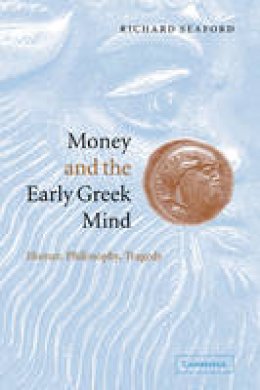
Stock image for illustration purposes only - book cover, edition or condition may vary.
Money and the Early Greek Mind: Homer, Philosophy, Tragedy
Richard Seaford
€ 60.09
FREE Delivery in Ireland
Description for Money and the Early Greek Mind: Homer, Philosophy, Tragedy
Paperback. An original theory that connects the development of coinage to the origins of rational philosophy in ancient Greece. Num Pages: 384 pages, black & white illustrations. BIC Classification: 2AHA; DSBB; HPCA. Category: (P) Professional & Vocational; (U) Tertiary Education (US: College). Dimension: 230 x 161 x 23. Weight in Grams: 560. Homer, Philosophy, Tragedy. 384 pages. An original theory that connects the development of coinage to the origins of rational philosophy in ancient Greece. Cateogry: (P) Professional & Vocational; (U) Tertiary Education (US: College). BIC Classification: 2AHA; DSBB; HPCA. Dimension: 230 x 161 x 23. Weight: 596.
How were the Greeks of the sixth century BC able to invent philosophy and tragedy? In this book Richard Seaford argues that a large part of the answer can be found in another momentous development, the invention and rapid spread of coinage which produced the first ever thoroughly monetised society. By transforming social relations, monetisation contributed to the ideas of the universe as an impersonal system (presocratic philosophy) and of the individual alienated from his own kin and from the gods (in tragedy). Seaford argues that an important precondition for this monetisation was the Greek practice of animal sacrifice, as ... Read more
How were the Greeks of the sixth century BC able to invent philosophy and tragedy? In this book Richard Seaford argues that a large part of the answer can be found in another momentous development, the invention and rapid spread of coinage which produced the first ever thoroughly monetised society. By transforming social relations, monetisation contributed to the ideas of the universe as an impersonal system (presocratic philosophy) and of the individual alienated from his own kin and from the gods (in tragedy). Seaford argues that an important precondition for this monetisation was the Greek practice of animal sacrifice, as ... Read more
Product Details
Publisher
Cambridge University Press
Number of pages
384
Format
Paperback
Publication date
2004
Condition
New
Number of Pages
384
Place of Publication
Cambridge, United Kingdom
ISBN
9780521539920
SKU
V9780521539920
Shipping Time
Usually ships in 4 to 8 working days
Ref
99-1
About Richard Seaford
Richard Seaford is Professor of Greek Literature at the University of Exeter. He is the author of commentaries on Euripides' 'Cyclops' (1984) and 'Bacchae' (1996) and of 'Reciprocity and Ritual: Homer and Tragedy in the Developing City-State' (1994).
Reviews for Money and the Early Greek Mind: Homer, Philosophy, Tragedy
'This book is of wider relevance than just to teachers and students of classics, for whom it affords an invaluable resource. It relates to all of us who, as Seaford says, 'live in a world in which the monetisation first observable in the Greek polis has had several centuries to develop ...' The Lecturer 'This book is a tour de ... Read more
